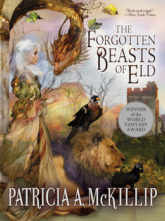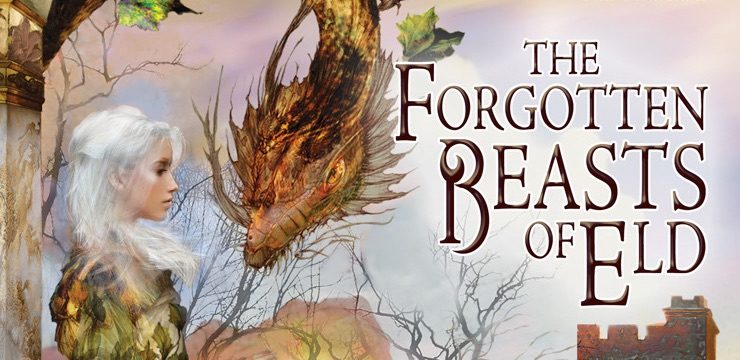What do you remember when you think of books you read long, long ago? Plot? Character? Setting? Or something more nebulous?
I tend to remember how a book felt, which is about as nebulous as things get. There’s usually one lingering image in my very visual-reader brain, as well. Jo Clayton’s Serroi books feel defiant, a small green girl in a looming landscape. Melanie Rawn’s dragon books are regal, but there’s one image of a picnic that I can never shake, and another of a valley.
Patricia A. McKillip’s The Forgotten Beasts of Eld, on the other hand, is a mountain home, a dragon, solitude, and defensiveness. Rereading the book, which Tachyon Publications just reissued, was a singular experience: marrying those feelings with what actually happens in the book, which both is and is not what I remember.
The Forgotten Beasts of Eld was first published in 1974, and won the inaugural World Fantasy Award the following year. Elegantly written, perfectly paced, it’s a slim volume that nevertheless shares bone structure with much of epic fantasy: an unlikely child, growing up out of the way, turns out to have the power to reshape the world of men.
McKillip took that structure, pared away all the fat, and turned her gaze inward. Sybel, with her wizard blood, grows up on a mountain with a magical bestiary for companionship: the dragon Gyld, the boar Cyrin, the Black Swan, the Cat Moriah, Gules Lyon, and Ter, the falcon. Each is a creature out of myth, held at Sybel’s stone home by the power of her father’s will—and then by Sybel’s. When her father dies, young Sybel remains alone, reading books, sending her mind out in search of one more beast: the great white bird, the Liralen, which remains elusive.
Reality intrudes in the form of Coren, a young man who brings Sybel a baby—her nephew, born of an aunt she never knew, and heir to a throne she cares nothing about. With the help of a witch woman who lives nearby, Sybel raises the child, Tamlorn, until the demands of the world mean that she can’t keep him—or herself—alone on the mountain anymore.
Though the new cover illustration makes Sybel look an awful lot like Daenerys Targaryen, she is a heroine the likes of which I’ve rarely encountered: self-contained, self-sustaining, content in her solitude, greeting adulthood on her own terms. Still, pieces of McKillip’s world resonate with other stories you might know: the forest of Mirkon suggests Tolkien’s Mirkwood; the dark Thing Sybel finds lurking about her house, which scares men half to death, reminds me of the thing called up by the wizard Ged in Le Guin’s Earthsea books.
Like Le Guin, McKillip gives her protagonist power, pride, and a thirst to know things. Sybel knows what she wants, and it has nothing to do with the power struggles of men. She wants the Liralen, and to stay at her home, learning, absorbing, collecting books and creatures. When an insecure king pulls her out of her home and threatens to take away her will, she thinks only of revenge, to the detriment of all her relationships.
You know the feeling you get when a beloved book is going to be adapted, and you want to protect it, to keep it within the frame of your own vision, your idea of what it looks like? I feel that way about Sybel, even as I love the story McKillip spins out for her. It’s a neat trick: letting the reader want one thing for a character while simultaneously convincing her that this life, the one in the story, is the right one.
Sybel’s real battle is with herself, and McKillip’s real magic lies in giving Sybel a story that feels entirely right—which also being entirely the opposite of what I selfishly want for this character. Even now, when I am grown-up and married and far from my own home, I want Sybel to keep her solitude, to keep her interiority, her self-sufficiency, her questing mind. The defiance that shapes how Forgotten Beasts “feels” to me—it’s a defiance that squares off against the world Sybel steps into. I want it all to leave her alone to her books and her familiars.
 This feeling is not entirely unlike the feeling that I, as a bookish tween, had about the world: I wanted it to leave me alone, with a book and a cat on my lap. “You can weave your life so long—only so long,” Coren says to Sybel, “and then a thing in the world out of your control will tug at one vital thread and leave you patternless and subdued.” McKillip tugs forcefully at the vital thread of Sybel’s power, makes her reconsider it, and reshapes her life as a result.
This feeling is not entirely unlike the feeling that I, as a bookish tween, had about the world: I wanted it to leave me alone, with a book and a cat on my lap. “You can weave your life so long—only so long,” Coren says to Sybel, “and then a thing in the world out of your control will tug at one vital thread and leave you patternless and subdued.” McKillip tugs forcefully at the vital thread of Sybel’s power, makes her reconsider it, and reshapes her life as a result.
Forgotten Beasts is a coming-of-age story that’s firmly about engaging with the world—about accepting that it’s incredibly difficult to truly hold yourself apart from it. It’s a story about compromise and freedom, and one that takes some difficult, uncomfortable, and heartbreaking turns on its way to a tempered but happy ending. What each character does with the freedom that’s granted to them moves me to tears, every time. Everything epic, the battles and ruling, happens in the background, while in the frame of McKillip’s regard, Sybel comes to understand change, and love, and trying to be the person you want to be while letting others be their own people as well. Intimate, gorgeous, quiet and deep, The Forgotten Beasts of Eld remains as resonant as ever, even if—especially if—it made me feel entirely differently about it this time around.
Molly Templeton is now going to have to read (or reread) McKillip’s entire backlist. Come talk to her about your favorites on Twitter!










